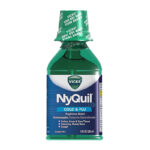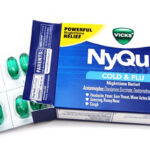NyQuil: Intended Uses and Potential Side Effects
Have you ever wondered why the cashier at a pharmacy or convenience store asks to see your ID when purchasing cold medicine? Some cold and flu medications, including NyQuil, contain DMX (dextromethorphan/doxylamine), which, when taken in high doses, can cause hallucinations. NyQuil also contains pseudoephedrine, which can cause dizziness and drowsiness. To avoid recreational use of the drug, customers have to prove they’re 25 years of age or older before purchasing these products. This is also why many pharmacies keep NyQuil and other cold medicines behind the counter and out of arm’s reach.
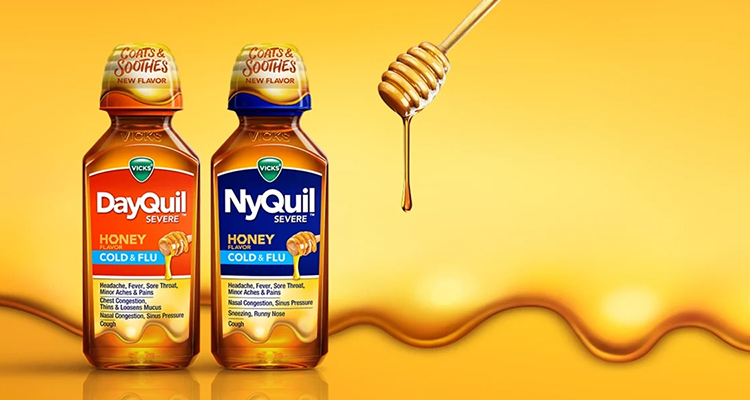
NyQuil is intended to treat nasal congestion and other cold and flu symptoms, with the added benefit of making you drowsy. This makes it easier for people to fall and stay asleep despite unpleasant cold symptoms. Unfortunately, once some users realize how well NyQuil works to induce sleep, they start to use it for insomnia relief, even in the absence of a cold or another ailment. But is this safe?
In this article, we’ll take a closer look at how NyQuil works as a decongestant and if it can also be used as a replacement for other sleep medications.
Content
What is NyQuil and How Does It Work?
NyQuil is one of the most well-known nasal decongestants on the market. An over-the-counter (OTC) medication, NyQuil helps ease common cold symptoms, especially at night, so you can sleep better. NyQuil relieves sneezing, coughing, headache, sore throat, and minor aches and pains – all symptoms that could make it difficult for you to fall and stay asleep.
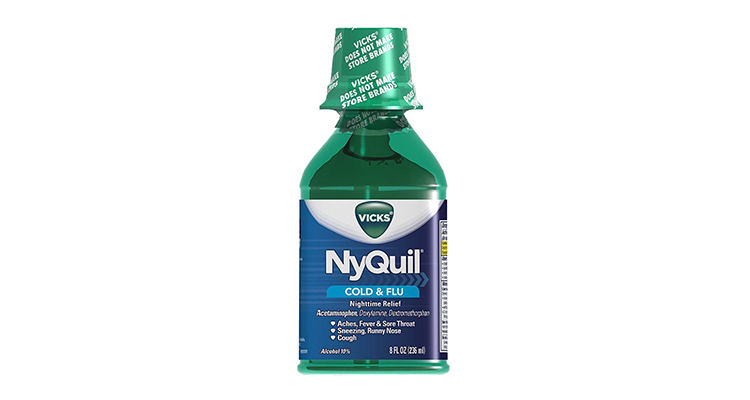
One of the main ingredients in NyQuil that causes drowsiness is doxylamine. This ingredient is intended to help you sleep, while phenylephrine works as a decongestant. People respond differently to both of these active ingredients, with some achieving quality sleep and waking to feel rested and energized while others struggle to wake up the next morning and feel groggy or “hungover”.
To prevent excess fatigue, only take the prescribed amount of NyQuil as listed on the box. This may differ based on your age, health history, the type of NyQuil you’re taking, and if it’s a capsule form or liquid. Most people can safely take two liquid gel caps or 30 milliliters of liquid NyQuil every 6 hours. No one should exceed four doses in any 24-hour period. Children 12 years of age and under should only ingest children’s NyQuil and never use the adult-strength varieties. Additionally, children’s NyQuil should only be taken to treat cold and flu symptoms and never as a sleep aid.
Using NyQuil as a Sleep Aid
Because NyQuil is notorious for causing drowsiness, some people turn to it strictly as a sleep aid, even in the absence of cold and flu symptoms. There are also different types of NyQuil, with some promoting sleep-inducing benefits more than others. These include NyQuil Cold and Flu, NyQuil Severe Cough, and NyQuil with added nighttime relief. The three main ingredients in all types of NyQuil are as follows:
- Acetaminophen – a pain reliever that also helps reduce fever
- Doxylamine succinate – an antihistamine used to treat sneezing, running nose, and itchy eyes
- Dextromethorphan HBr – Suppresses cough
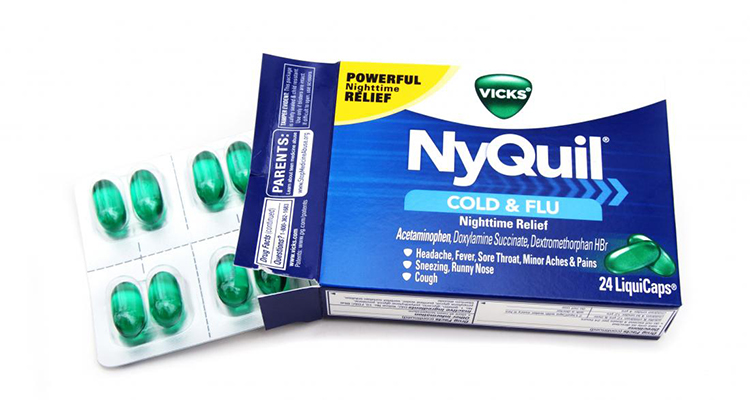
So, which of these ingredients causes sleepiness? The antihistamine doxylamine interacts with natural chemicals in the body known as histamines. These are responsible for controlling your circadian rhythm and triggering your immune system to respond when it detects a foreign body. Doxylamine blocks these histamines from entering your body, in turn, blocking cold and flu symptoms. But it also prevents histamines from signaling to your brain that it’s time to wake up, causing you to feel drowsy.
The types of NyQuil intended for sleep and labeled “nighttime relief” contain higher levels of these ingredients to help you sleep while easing discomfort from cold and flu symptoms. NyQuil usually takes effect within 30 minutes and lasts for up to 6 hours, depending on the dosage. That means you may find yourself getting drowsy less than an hour after taking the medicine and feeling tired enough to sleep through the night.
So, does that mean you can or should use NyQuil as a sleep aid? Not necessarily. Although NyQuil can help you sleep better when you’re sick with a cold, flu, or cold-related symptoms, it shouldn’t be used on its own as a sleep aid. Many antihistamines linger in your system long after the initial effects wear off, leaving you feeling groggy and disoriented the next day. This can lead to daytime drowsiness, which will ultimately affect the following night’s sleep as well, creating an unhealthy cycle of sleep disturbances.
Potential Side Effects of NyQuil
Lingering drowsiness the next day isn’t the only unpleasant side effect of NyQuil. Even if you’re taking this medication to treat cold and flu symptoms and not to help you sleep better at night, you should be aware of the potential side effects, including:
- Dry mouth or sore throat
- Nausea
- Nervousness
- Dizziness
- Constipation
- Confusion or hallucinations
- Seizures
- Difficulty urinating
- Inability to wake up
- Rash or blisters
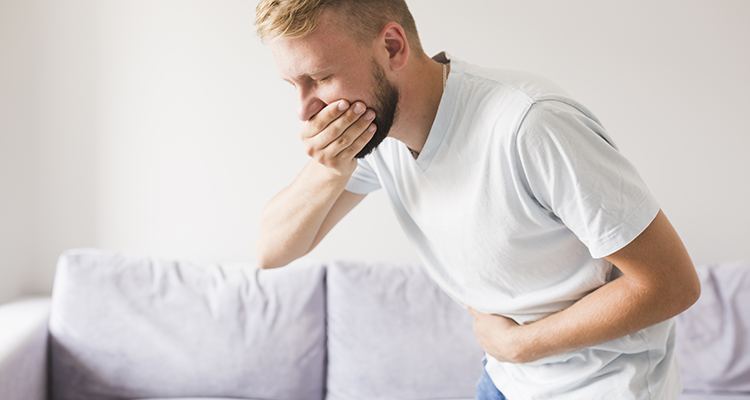
People with certain pre-existing medical conditions shouldn’t take NyQuil. These include, but aren’t limited to:
- Thyroid disease
- Glaucoma
- High blood pressure
- Diabetes
It’s also recommended not to take NyQuil if you’re already taking medication containing acetaminophen.
The Risk of Addiction to NyQuil
Other risks of NyQuil include addiction and dependency, especially when taken in large doses or for recreational use rather than to treat an ailment. While most people can take this cold and flu medicine without any risk of addiction, it is possible, especially when used primarily for its sleep inducing benefits.
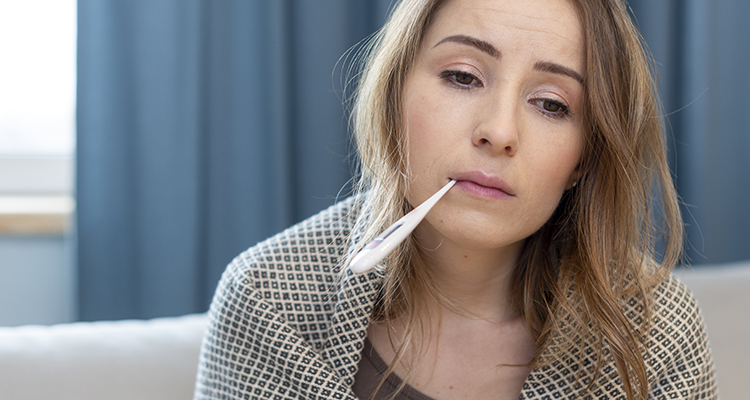
One reason is that liquid NyQuil contains 10% alcohol. NyQuil also contains dextromethorphan, which can have hallucinogenic effects in some people and create a “high” feeling, distorted reality, and even psychosis. While this may be troubling for some people, others ingest NyQuil specifically to experience these effects. (Hence why customers must show proof of age to purchase most forms of NyQuil.)
Taking NyQuil for anything other than its intended use or in larger doses than prescribed could put you at risk of an overdose, though rare. Signs of a NyQuil overdose include:
- Fever
- Agitation
- Increased heart rate
- Nausea or vomiting
- Impaired motor function or numbness
- Visual or auditory hallucinations
- High blood pressure
If you suspect you’ve experienced an overdose, contact poison control immediately.
Tips for Easing Insomnia Symptoms without Medication
There’s nothing wrong with using NyQuil to ease your cold and flu symptoms so you can finally get a good night’s sleep, minus the coughing, sneezing, and headache. But using NyQuil long-term to achieve sleep is not only dangerous but could have serious side effects.

Ultimately, you need to make lifestyle changes in order to overcome chronic insomnia and improve your overall health and well-being. Here are some tips for simple changes you can make that will have a significant, positive impact on your life, sleep, and health.
Reduce Stress and Anxiety
For those looking to sleep aids and other drugs to ease stress and anxiety, these tips are for you. Anxiety is one of the leading causes of insomnia and other sleep disturbances. By reducing your anxiety, you can fall asleep faster, stay asleep, and stop depending on outside sources for relief – including medication.
Meditation and mindfulness are two effective and easy ways to help reduce anxious thoughts, ease stress, and gain better control of your thoughts and feelings. You can also adopt a new hobby, get plenty of fresh air, and practice other acts of self-care.
Adopt a Healthy Diet and Exercise Routine
Diet and exercise do more than just help you maintain a healthy weight. (Although this is important too, given obesity is one of the leading causes of sleep apnea – a dangerous and serious sleep disorder).
Incorporating exercise and physical activities into your day can not only boost confidence and improve your mood but also better prepare you for sleep at night. Try starting your day with a workout and avoid exercising too close to bedtime, which may cause unwanted arousal.
Eating a well-balanced diet and avoiding unhealthy habits like smoking cigarettes or drinking alcohol in excess can also promote better sleep. All of these healthy activities combined strengthen your immune system and may reduce the need for OTC medications of any kind, including NyQuil.
Set a Sleep Schedule
Another way to promote sleep and ensure you’re getting the recommended 7 to 9 hours is to create a sleep schedule. This involves setting a bedtime and sticking to it (even on weekends and holidays), and also getting up at the same time every morning. Doing so helps balance your body’s circadian rhythm, which is also impacted by the use of antihistamines. Before long, you’ll find yourself getting tired around the same time each night and waking up without the need for an alarm.
You can also practice the same routine behaviors leading up to bedtime, which will act as triggers for your brain and body that it’s time to prepare for sleep. Things like writing in a journal, reading a book, taking a walk, meditating, or drinking chamomile tea are all great ways to prepare for bed.
Ease Insomnia Symptoms and Start Living Your Best Life
No one likes being sick. If you’re suffering from cold and flu symptoms that are keeping you up at night, taking decongestant medications like NyQuil for a short period of time can effectively ease symptoms and help you get some much-needed sleep. After all, sleep is one of the best things for fighting off an illness. However, if you find yourself reaching for these medications long after your cold and flu symptoms have dissipated, you may be at risk of addiction or dependency.

Instead of using potentially harmful medications to achieve quality sleep, why not consider an online sleep therapy program that utilizes CBT-i? Through the use of therapy, meditation, and self-reflection, you can make the necessary changes to finally achieve the quality sleep you need. Click here to learn more about our revolutionary program.

